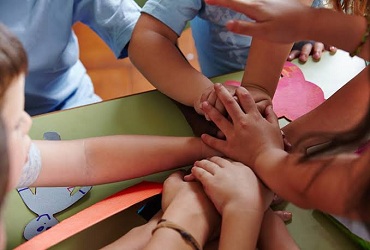How to Develop Relationship Skills in preschoolers.
Relationship Skills are necessary to establish and maintain healthy and supportive relationships by communicating clearly, listening actively, cooperating, and working collaboratively to solve problems and negotiate conflict constructively. It does not limit to these skills, it extends it to asking or offering help when needed and standing up to injustice. (CASEL)
To build relationships with others, the child needs to follow the norms of Prosocial behavior. Prosocial behavior starts to develop in toddlerhood (Roth-Hanania, Davidov, & Zahn-Waxler, 2011). By the age of three, children are able to perform acts of sharing, can understand others, be empathetic towards them and efficiently work with them. Healthy relationship building requires communication, listening, and the ability to repair them if a conflict arises.
Prosocial behaviors are taken in by young children quickly. It is important to teach them the skill of social awareness, which develops prosocial skills of empathy, effective communication, and acceptance. Establishing relationships with parents, teachers, and peers is important for the child’s emotional and social development.
Caregivers are primary educators as the child observes and learns behaviors from them. They ought to listen to their child's needs, validate their feelings, help them to strengthen their self-esteem, and be a role model to them, hence setting a strong foundation. They also provide a safe environment for the child’s holistic development. Instructions from parents help the child to manage their emotions but a school setting might prove to be challenging for them, where they have to meet and maintain relationships with a larger group of people.
In preschool, children look up to teachers and educators to guide them. Educators have a responsibility to support and make their students trust them. Learning their names with correct pronunciation helps in valuing their diversity. Communicating through verbal and non-verbal cues, giving them useful instruction, and simply listening to their needs. This ensures the child can trust the school staff which helps in building relationship skills in them.
Peer relationships are made when students experience advantageous improvement aids from both caregivers and teachers. They mirror the techniques which their elders set up for them and apply them to build relationships with their peers. Children learn to appreciate and compliment each other, and connect to others and make them feel heard. Academic accomplishments are related to social interactions with peers (Steedly, Schwartz, Levin, & Luke, 2011).
Some Competencies which a aids in building relationship skills in preschool are:
- Promoting sharing among children develops the skill of cooperation which helps in making friends.
- Teamwork helps in promoting the essential skills of collaboration and problem-solving.
- Conflict resolution is a skill which advances in preschool. It aids in preserving healthy bonds with others.
- Praising children for good behavior ensures it to be repeated in the future (B.F. Skinner).
As social beings, who constantly need to interact with others, establishing and maintaining relations is a necessary part of life. It also helps in building the identity of a child as a separate individual. It benefits them to deal with their issues in a preferable manner. It instills in them the knowledge and acceptance of different cultures. Healthy relationship skills improve goal-achieving aptitudes as well as promote self-management and self-motivation.

